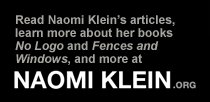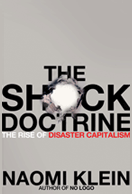The Shock Doctrine

Disaster Capitalism in Action: oil industry
Peter Galbraith, U.S. Adviser to Kurds, Stands to Reap Oil Profits
James Glanz and Walter Gibbs, New York Times, November 12, 2009
"Now Mr. [Peter] Galbraith, 58, son of the renowned economist John Kenneth Galbraith, stands to earn perhaps a hundred million or more dollars as a result of his closeness to the Kurds, his relations with a Norwegian oil company and constitutional provisions he helped the Kurds extract.
"In the constitutional negotiations, he helped the Kurds ram through provisions that gave their region — rather than the central Baghdad government — sole authority over many of their internal affairs, including clauses that he maintains will give the Kurds virtually complete control over all new oil finds on their territory....
"Some officials say that his financial ties could raise serious questions about the integrity of the constitutional negotiations themselves. 'The idea that an oil company was participating in the drafting of the Iraqi Constitution leaves me speechless,' said Feisal Amin al-Istrabadi, a principal drafter of the law that governed Iraq after the United States ceded control to an Iraqi government on June 28, 2004. In effect, he said, the company 'has a representative in the room, drafting.'"
See Also:
An Inside Iraq panel about the Galbraith scandal on Al Jazeera English
An interview with Peter Galbraith on National Public Radio
Chevron Seeks $500,000 from Nigerian Villagers; Profits $23.8 Billion in 2008
Richard C. Paddock, Los Angeles Times, February 8, 2009
"Chevron Corp., which prevailed in a human-rights lawsuit seeking to hold it responsible for the shooting of Nigerian protesters at an oil platform, is seeking nearly $500,000 in legal costs from the villagers who brought the suit.
"Chevron's claim for reimbursement, filed in federal court, includes $190,000 in copying charges. The San Ramon-based company, which posted a record $23.8-billion profit for 2008, says it is entitled to the money because a nine-member jury decided in the company’s favor in December....
"Laura Livoti, founder of Bay Area-based Justice in Nigeria Now, said the $485,000 sought by Chevron, California's largest company, would constitute a fortune for the Nigerians. That sum would be enough to sustain at least four villages in the Niger Delta for a year, she said....
"Bert Voorhees, who represented the Nigerians at trial, said Chevron's goal was not necessarily to collect money from the plaintiffs but to deter others from pursuing similar suits."
Utah Student Poses as Bidder, Disrupts Auction of Environmentally-Sensitive Land for Oil Drilling
Interview, Democracy Now!, December 22, 2008
AMY GOODMAN: While many environmental groups launched campaigns to oppose the sale of the land [environmentally sensitive federal lands in Utah being sold to oil companies], one student in Salt Lake City attempted to block the sale by disrupting the auction itself. Twenty-seven-year-old Tim DeChristopher posed as a potential bidder and bid hundreds of thousands of dollars on parcels of the land, driving up prices and winning some 22,000 acres for himself, without any intention of paying for them. The Bureau of Land Management must now wait over a month before it can auction off these properties, but by then the bureau will no longer be run by the Bush administration....
TIM DECHRISTOPHER: I started off, actually, at a final exam at the university and went straight from there down to the BLM office. And I saw some protesters walking back and forth outside, and I knew that I wanted to do more than that and that this kind of injustice demanded a higher level of disruption. And so, I just decided that I wanted to go inside and cause a bigger disruption.
And from there, I found it really easy to get inside and become a bidder, and went inside and was in the auction room. And once I was in there, I realized that any kind of speech or disruption or something like that wasn't going to be very effective, but I saw pretty quickly that I could have a pretty major impact on the way this worked. And it just took me a little bit of time to build up the courage to do that, knowing what the consequences would be. And so, I started bidding and started driving up the prices for some of the oil companies. And throughout that time, I knew that I could be doing more and could really set aside some acres to really be protected. And so, then I started winning bids and disrupting it as clearly as I could....
Jay Garner, Former Administrator for Iraq, Now Helping Canadian Companies Secure Oil Deals in Kurdistan
Anthony Fenton, Mother Jones, November 24, 2008
"In the history of the Iraq War, one name is perhaps synonymous with the collapse of the Bush administration's hopes for a post-Saddam world: Retired Lt. General Jay M. Garner. It was Garner who served as the first post-war administrator for Iraq, running the country during the fateful two months immediately following the invasion before being replaced by L. Paul Bremer III.
"However, Garner's frustrating tenure in Iraq wasn't entirely wasted. This year, he and a small group of former US military leaders, officials, and lobbyists have quietly used their deep connections in Kurdistan to help Canadian companies access some of the region's richest oil fields....
"As for Garner, the success of the Vast deal has evidently encouraged him and his associates to pursue more opportunities in Iraq. He and Hite are on the board of Eurocontrol, a company that designs oil theft technology. Eurocontrol's CEO, Bruce Rowlands, says the company is exploring opportunities in Iraq, and that Garner and Hite are helping to facilitate contracts there. Garner and Hite's ability to interpret Iraq's 'political sub-plots' and their understanding of the 'U.S. industrial military complex' is, Rowlands says, 'invaluable.'"
Exxon Profits $1,500 A Second
Steve Hargreaves, CNN Money, July 31, 2008
"Exxon Mobil once again reported the largest quarterly profit in U.S. history Thursday, posting net income of $11.68 billion on revenue of $138 billion in the second quarter. That profit works out to $1,485.55 a second. That barely beat the previous corporate record of $11.66 billion, also set by Exxon in the fourth quarter of 2007....The company returned $10.1 billion to shareholders in the form of dividends and stock buybacks."
See also:
- Royal Dutch Shell's profits are up 33% to more than $11.5 billion
- BP's profits rose 28% to nearly $9.5 billion
- Chevron profits nearly $6 billion
Big Oil Avoids Paying $1.3 Billion in Royalties for Offshore Drilling
Tyson Slocum, Public Citizen, July 30, 2008
"A bureaucratic oversight has allowed 24 oil companies to avoid more than $1.3 billion in royalties for the privilege of extracting oil and natural gas from U.S. territory in the Gulf of Mexico - with foreign companies responsible for 55 percent of that total. But this $1.3 billion in forgone royalties pales in comparison to the $60 billion that Americans stand to lose in royalty revenue over the life of these leases. And if Congress repeals the moratorium on Outer Continental Shelf (OCS) drilling that has existed since 1982, these freeloading oil companies will be eligible to bid on new leases, providing them with more record profits while American families are left holding the bag. These 24 companies have posted a combined $365 billion in profits since 2006.
"The list of the specific companies comes from a February 2008 U.S. Department of Interior memo recently obtained by Public Citizen. Four of the 24 companies (BP, Marathon, Shell and Walter Oil & Gas) signed voluntary agreements to pay royalties going forward, but they will not be required to pay the more than $200 million taxpayers have been denied on production that already has occurred."
Neocon Richard Perle Linked to Iraqi Oil Deal
Susan Schmidt and Glenn R. Simpson, Wall Street Journal, July 29, 2008
"Influential former Pentagon official Richard Perle has been exploring going into the oil business in Iraq and Kazakhstan, according to people with knowledge of the matter and documents outlining possible deals.
Mr. Perle, one of a group of security experts who began pushing the case for toppling Iraqi dictator Saddam Hussein about a decade ago, has been discussing a possible deal with officials of northern Iraq’s Kurdistan regional government, including its Washington envoy, according to these people and the documents....
"Mr. Perle, who was an assistant Defense secretary in the Reagan administration, is known for his strong support of Israel and hawkish views on arms control. In the early days of the Bush administration, he was one of the most influential proponents of U.S. military action to oust Iraq’s President Hussein. Mr. Perle was chairman of the Defense Policy Board, which advises the Pentagon, but resigned in March 2003 amid criticism of his role as an adviser to a telecom company that was seeking U.S. government approval for a sale to Asian investors."
Mexican Voters Reject Increasing the Role of Private Oil Companies
Marla Dickerson, Los Angeles Times, July 29, 2008
"Turnout was light, but voters in a nonbinding referendum gave an overwhelming "no" to President Felipe Calderon's proposal to give private firms a bigger role in Mexico's government-controlled petroleum industry....
Mexico is the world's sixth-largest petroleum producer, and the industry is the nation's largest taxpayer....
"Calderon in April sent legislation to Congress that would loosen some restrictions on Pemex, enabling it to team up with foreign oil companies to extract the nation's undersea oil. His plan also calls for more private investment in areas such as refining and storage. Opponents say Calderon's real objective is to privatize Pemex, a charge the president denies."
Oil Industry Execs Pour Money into McCain's Campaign
Matthew Mosk, Washington Post, July 27, 2008
"Campaign contributions from oil industry executives to Sen. John McCain rose dramatically in the last half of June, after the senator from Arizona made a high-profile split with environmentalists and reversed his opposition to the federal ban on offshore drilling.
"Oil and gas industry executives and employees donated $1.1 million to McCain last month -- three-quarters of which came after his June 16 speech calling for an end to the ban -- compared with $116,000 in March, $283,000 in April and $208,000 in May."
See also: The Los Angeles Times on Hess Corporation executives and family members' large donations to McCain's fundraising committee.
Oil Drilling Firms' Stocks Rise After Bush Lifts Executive Ban on Offshore Drilling
Laura Mondaro, MarketWatch, July 14, 2008
"President Bush said Monday afternoon he had ordered a reversal of an executive ban on oil and natural gas drilling in offshore U.S. waters, adding it was now up to Congress to turn his decision into law....
"The decision to lift the ban was quickly applauded by industry groups including the U.S. Chamber of Commerce and the American Chemistry Council, which say their members are suffering from escalating energy prices. Last month, Dow Chemical Co. said it was raising its prices by as much as 25% in July to offset higher petroleum input costs. At the same time, analysts noted any action to open up drilling - even if there's a remote chance of such a law making its way through Congress - could be a boon for oil drillers.
"Hercules Offshore Inc. and and Pride International stand the most to gain, said Pritchard Capital Partners' analyst Brian Uhlmer, because the firms have the largest exposure to drilling rigs appropriate for the U.S. continental shelf. Shares of Hercules gained 6%, outpacing a 2.1% rise in the Philadelphia Oil Service Index. Shares in Pride closed 0.8% higher."














